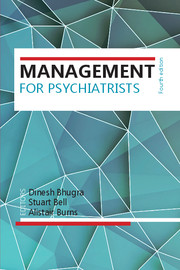Book contents
- Frontmatter
- Contents
- List of contributors
- List of figures, tables and boxes
- Preface
- Part I Theoretical overview
- Part II Changes and conflicts
- 11 Medical leadership skills: what is needed to be a successful leader?
- 12 Understanding systems
- 13 Working with the team
- 14 Managing multicultural and multinational teams in healthcare
- 15 Management of change
- 16 Managing the psychiatrist's performance
- 17 Revalidation for psychiatrists
- 18 Quality improvement tools
- 19 Quality and quality governance
- 20 Measurement of needs
- 21 Service users’ expectations
- 22 Clinical audit
- 23 Confidentiality and management in healthcare organisations
- 24 Patient complaints: every doctor's business
- 25 Mental health review tribunals. Or, tribunals, and how to survive them
- Part III Personal development
- Index
13 - Working with the team
from Part II - Changes and conflicts
Published online by Cambridge University Press: 02 January 2018
- Frontmatter
- Contents
- List of contributors
- List of figures, tables and boxes
- Preface
- Part I Theoretical overview
- Part II Changes and conflicts
- 11 Medical leadership skills: what is needed to be a successful leader?
- 12 Understanding systems
- 13 Working with the team
- 14 Managing multicultural and multinational teams in healthcare
- 15 Management of change
- 16 Managing the psychiatrist's performance
- 17 Revalidation for psychiatrists
- 18 Quality improvement tools
- 19 Quality and quality governance
- 20 Measurement of needs
- 21 Service users’ expectations
- 22 Clinical audit
- 23 Confidentiality and management in healthcare organisations
- 24 Patient complaints: every doctor's business
- 25 Mental health review tribunals. Or, tribunals, and how to survive them
- Part III Personal development
- Index
Summary
This chapter is about teamwork within mental health services. The authors’ experience is as adult and rehabilitation psychiatrists with management roles working in England, but the principles are relevant to almost all aspects of psychiatric practice.
It is now a truism that teamwork is an essential component of any safe and effective healthcare organisation (Baker et al, 2006; Jenkinson et al, 2013; Nancarrow et al, 2013). Indeed, effective teamwork is seen as vital for undertaking complex and potentially risky tasks across a wide range of activities, from flying a passenger jet to successfully completing a construction project. Although there is a tendency to think of teams as stable and long-term entities, teamwork is often required when people have little or no knowledge of one another – for example, two pilots newly rostered together to take a flight across the Atlantic Ocean, or when a junior doctor arrives on a ward in an emergency or when agency nursing staff come to work on a ward.
Teamwork is defined in the New Shorter Oxford English Dictionary as ‘the combined action of a team of players or a group of people especially when effective and efficient’ or, alternatively, ‘co-operation’. In the organisational literature, teams have been defined as ‘social entities embedded in organisations, performing tasks which contribute to the organisation's goals’ (West et al, 1998: p. 2). Less abstractly, researchers have understood a team to consist of ‘two or more individuals, who have specific roles’, who ‘perform interdependent tasks, are adaptable, and share a common goal’ (Baker et al, 2006: p. 1578). A concept analysis proposed a more refined definition of teamwork in healthcare: ‘a dynamic process involving two or more healthcare professionals with complementary backgrounds and skills, sharing common health goals and exercising concerted physical and mental effort in assessing, planning, or evaluating patient care’ (Xyrichis & Ream, 2008: p. 232). These differing definitions share an optimistic view of teamwork.
Mental healthcare has, since the rise of the asylum, always involved people from different backgrounds and with different roles working together in an organisational structure. Samuel Tuke's Description of the Retreat, published in 1813, reports in detail the work of key people in the early years of this pioneering asylum, which was set up by the Quaker community in York.
- Type
- Chapter
- Information
- Management for Psychiatrists , pp. 167 - 184Publisher: Royal College of PsychiatristsPrint publication year: 2016



